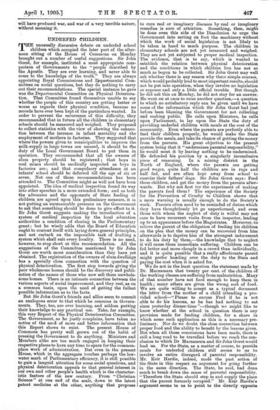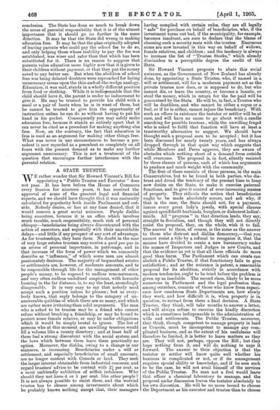UNDERFED CHILDREN. T HE unusttally discursive debate on underfed school children
which occupied the later part of the after- noon sitting of the House of Commons on Monday brought out a number of useful suggestions. Sir John Gorst, for example, instituted a most appropriate com- parison of Governments to the "people described by the Apostle. They are ever learning, and never able to come to the knowledge of the truth." They are always appointing Royal Commissions and 1)epartmental Com- mittees on social questions, but they do nothing to carry out their recommendations. The special instance he gave was the Departmental Committee on Physical Deteriora- tion. That Committee found themselves unable to say whether the people of this country are getting better or worse as regards their physical condition, because no records have ever been kept of the particulars wanted. In order to prevent the recurrence of this difficulty, they recommended that in future all the children in elementary schools should be measured and weighed. They proposed to collect statistics with the view of showing the connec- tion between the increase in infant mortality and the employment of mothers in factories. They suggested that where the powers given to municipalities to improve the milk-supply in large towns are unused, it should be the duty of the Local Government Board to put them in operation. They recommended that all the owners of slum property should be registered ; that boys in coal mines should be medically inspected as boys in factories are ; and that compulsory attendance at an infants' school should be deferred till the age of six or seven. Not one of these recommendations has been attended to. The Committee might as well not have been. appointed. The idea of medical inspection found its way into other speeches in a more extended form ; and as both the advocates and the opponents of State feeding of children are agreed upon this preliminary measure, it is not putting an unreasonable pressure on the Government to ask that something should be done to give effect to it. Sir John Gorst suggests making the introduction of a system of medical inspection by the local education authorities a condition of sharing in the Parliamentary grant ; but he wisely adds that the Board of Education ought to content itself with laying down general principles, and not embark on the impossible task of drafting a System which shall suit every locality. There is no need, however, to stop short at this recommendation. All the suggestions of the Committee mentioned by Sir John Gorst are worth more consideration than they have yet obtained. The registration of the owners of slum dwellings has a specially close connection with the question of physical deterioration. The first step towards giving the poor wholesome homes should be the discovery and publi- cation of the names of those who now sell them unwhole- Some homes. There is an intimate connection between the various aspects of social improvement, and they rest, as on a common basis, upon the need of getting the fullest possible information as to the facts.
But Sir John Gorst's friends and allies seem to commit an analogous error to that which he censures in Govern- ments. They, too, are ever learning, and seldom putting their knowledge to any practical use. Take, for example, this very Report of the Physical Deterioration Committee. The Government, as he justly complains, have taken no notice of the need of more and better information that this Report shows to exist. The present House of Commons has pretty well grown out of the habit of pressing the Government to do anything. Ministers and Members alike are too much engaged in keeping their respective places to have any time to spare for the common- place work of administration. But even in the present House, which in the aggregate touches perhaps the low- water mark of Parliamentary efficiency, it is still possible to gain a languid attention for some social questions, and physical deterioration appeals to that general interest in our own and other people's health which is the character- istic feature of the new century. From "Christian Science" at one end of the scale, down to the latest patent medicine at the other, anything that proposes to cure real or imaginary diseases by real or imaginary remedies is sure of attention. Something, then, might be done even this side of the Dissolution to urge the Government into setting on foot the machinery without' which the work of social legislation is not likely 'to be taken in hand to much purpose. The children in elementary schools are not yet measured and weighed. They are not yet subjected to proper medical inspection. The evidence, that is to say, which is wanted to establish the relation between physical deterioration and the conditions in which children live has not so much as begun to be collected. Sir John Gorst may well ask whether there is any reason why these simple courses, which would probably lead to most important results, should not be put into operation, when they involve no legislation or expense and only a little official trouble. But though he did. ask this on Monday, he did not stay for an answer. He went on at once to raise another question,—a question to which no satisfactory reply can be given until we have some of the information which Sir John Gorst had just before been blaming the Government for not collecting and making public. He calls upon Ministers, he calls upon Parliament, to lay upon the State the duty of providing underfed children with meals at the cost of the community. Even where the parents are perfectly able to feed their children properly, he would make the State provide the meals, and take its chance of getting the money from the parents. His great objection to the present system being that it "undermines parental responsibility," he would meet it by leaving nothing to be undermined. He defended his position by a singularly inconclusive piece of reasoning. In a mining district in thq North of England, where the parents are getting good wages, quite half the children are in rags and half fed, and are often kept away from' school' to exercise their fathers' dogs. Sir John Gorst says : Feed these children, and. get the money from the parents after- wards. But why not first try the experiment of making the parents feed them? The experience of the Society for the Prevention of Cruelty to Children shows that a mere warning is usually enough to do the Society's work. Parents often need to be reminded of duties which they have thoughtlessly let go unperformed, and even those with whom the neglect of duty is wilful may not care to have recurrent visits from the inspector, leading up to an appearance before the Magistrates. Moreover, to relieve the parent of the obligation of feeding his children On the plea that the money can be recovered from him afterwards is to deprive him of the strongest inducement to do his duty by them,—the knowledge that to neglect it will cause them immediate suffering. Children can be fed better and more cheaply in a crowd than individually, and it is quite possible that a really affectionate parent might prefer handing over the duty to the State and paying the cost when it is asked for. We do not in the least question the statement made by Dr. Macnamara that twenty per cent. of the children of the working classes are suffering from malnutrition. Many of that number have not food enough to keep them in health ; many others are given the wrong sort of food. We are quite willing to accept as a typical document the letter from the mother of a child attending a pro- vided school—" Please to excuse Fred. if he is not able to do his lessons, as he has had nothing to eat since yesterday dinner-time "—though we might like to know whether at the school in question there is any provision made for feeding children, for a share in which some such application as this is a necessary pre- liminary. Nor do we doubt the close connection between proper food and the ability to benefit by the lessons given. But when all these concessions have been made, there is still a long road to be travelled before we reach the con- clusion to which Dr Macnamara and Sir John Gorst would lead us. For the State, as a matter of course, to provide meals for underfed children still seems to us to involve an entire disregard of parental responsibility. Mr. Keir Hardie, indeed, made the past action of the State in this respect an argument for going further in the same direction. The State, he said, had done much to break down the sense of parental responsibility. "Therefore the State should step in and supply the place that the parent formerly occupied." Mr. Ken. Hardie's argument seems to us to point to the directly opposite conclusion. The State has done so much to break down the sense of parental responsibility that it is of the utmost importance that it should go no further in the same direction. It may be that the State did wrong in making education free. It may be that the plan originally adopted of leaving parents who could pay the school fee to do so, and only helping those whose inability to pay the fee was established, was wiser and safer than that which has been stbstituted for it. There is no reason to suppose that parents value education more highly now that it is given to their children without payment, or that they put the money saved to any better use. But when the abolition of school fees was being debated. doubters were reproached for laying unnecessary stress upon the thin-end-of-the-wedge analogy. Education, it was said, stands in a wholly different position from food or clothing. While it is indispensable that the child should have it, the parent is under no inducement to give it. He may be trusted to provide his child with a meal or a pair of boots when he is in want of them, but he cannot be trusted to give him the opportunity of instruction unless he can do so without having to put his hand in his pocket. Consequently you may safely make education free, because it stands so entirely apart that it can never be cited as a precedent for making anything else free. Now, on the contrary, the fact that education is free is used as an argument for making other things free. What was never in any circumstances to become a pre- cedent is now regarded as a precedent so completely on all fours with the present demand as to make any further argument unnecessary. This is not a treatment of the question that encourages further interference with the parental relation.







































 Previous page
Previous page